LeBron James and Akron Public Schools opened the I Promise School with great fanfare on July 30, 2018.
But what happened after TV news cameras stopped rolling, James left to join the Los Angeles Lakers, and the faculty and staff had to actually implement their plan of how to make a difference in the lives of 223 of the most at-risk 3rd and 4th graders in the system?
That is the subject of “I Promise,” a documentary now streaming on . The project originally premiered in 2020 as a short-form series on the streaming platform Quibi. Stitched together with additional footage and a new epilogue, the now feature-length film chronicles the challenging first year of the experimental school.
It opens with a sobering statistic: In the U.S., a student drops out of school once every 26 seconds.
“It’s almost like when you grow up in the inner city or you grow up in the projects, no one cares about you,” James says, explaining his motivation for opening the school. “The goal and mission of the school is for the kids to feel like they’re superheroes.”
The documentary, produced by James and Maverick Carter’s entertainment firm The SpringHill Company, could’ve easily turned into a vanity project. Indeed, the NBA superstar appears often in the film, though most of his onscreen time is limited to the first 15 minutes. Fortunately, everybody involved recognized watching him talk about the school and hear others praise him for it does not make for a compelling film.
Instead, director Marc Levin was determined to deliver an accurate representation of the school’s inaugural year, warts and all. Every feel-good story, after all, has its share of obstacles and failures. His decision to narrow his focus to a handful of students and capture the experience through their eyes is an effective one.
One of them is Vincent, a 4th grader who was bullied and became so disruptive at his last school, his teacher made him sit in the corner by himself. As a result, he showed no interest in learning.
“My tears were dripping. It was like a pool of water,” says Vincent, describing the first day at I Promise School. “I hate this school.”
There’s also Nate, a 3rd grader who has witnessed violence at a young age and walks out of class whenever he gets frustrated. Classmate Dae’Shaunna is prone to throwing temper tantrums and getting into fights. They’re joined by Scout, another 3rd grader, who is so embarrassed by her reading difficulties she won’t try to read in front of people.
Levin directs with a deft touch, presenting the tremendous challenges each of them has already faced in their young lives with emotion and even humor. If you don’t become invested in their stories, you’re not paying attention. But how do you put these kids on the right path? Turns out, the answer isn’t as simple as sending them to a school with LeBron James’ name on it.
“It’s not instant oatmeal we’re creating here,” James acknowledges. “You can’t just put the oatmeal pack in the bowl, put it in the microwave and a minute later, you’re ready to go. We’re OK with dealing with the process.”
That process is guided by a STEM curriculum, trauma-informed teaching, and an emphasis on the idea that the entire school is one big family. The approach means teachers gaining the students’ trust by encouraging them to share their feelings openly, doling out a hug or high-five when needed, and the school providing the support the families need so the kids can concentrate on their studies.
It doesn’t always work. There are skirmishes out on the playground, outbursts in the classrooms and one kid is put into handcuffs. Most concerning, only 11 students in the entire school pass the practice version of the state-required reading test that sends them through to the next grade.
It’s not instant oatmeal we’re creating here. You can’t just put the oatmeal pack in the bowl, put it in the microwave and a minute later, you’re ready to go. We’re OK with dealing with the process.
James serves as the main hero, swooping in from L.A. on occasion to give the students and teachers a pep talk. But the film makes it clear the educators, most of whom came directly from the Akron public school system, are heroes in their own right, too. Recognizing their approach isn’t working after that poor test performance, it’s inspiring to see the principal Brandi Davis and her staff pivot and come up with new strategies to make sure the kids pass the real test in the spring. (Davis, who is featured prominently in the documentary, was recently after being accused of slapping a student.)
I’m not going to spoil the ending, but early in the film 4th grade teacher Stephanie Arnett says, “I think we really could start a revolution in public schools.” Watching “I Promise” makes it easy to believe her.






